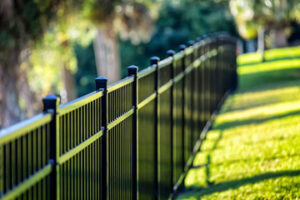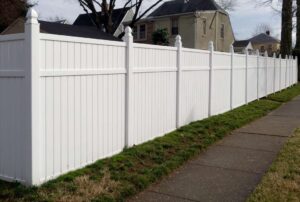There are many types of fences to consider if you want to keep your yard safe and beautiful. Each type has its own set of pros and cons, so you’ll have to decide which one suits your needs best.
Wrought iron fences are elegant and can add a touch of class to any home. However, they are expensive and do not offer security or pet containment. You should consult with Fence Company Charlotte NC experts before getting started.

Wood
Wood fences are a popular choice among homeowners because of their beauty and versatility. They come in a wide range of styles from traditional to contemporary and can be painted or stained in any color you like. A primary benefit of wooden fencing is the fact that it is naturally durable. It is also a good ecological choice. Trees that have been used to make fences can be replanted or recycled. In addition, the process of growing and cultivating wood does not harm the environment.
When it comes to choosing a type of wood for your fence, the most common options include pine, cedar, and oak. Each offers unique benefits, so it is important to discuss your preferences with your fence contractor. For example, pine is a softwood, so it is easy to work with. It is also resistant to shock and will last 15 to 20 years if it is well-maintained. Cedar is a hardwood that is renowned for its durability. It is also rot-resistant, which increases its lifespan. It also contains natural oils that act as a deterrent to insects. Cedar will need to be treated with a wood stain to protect it from the elements and prevent it from turning gray.
Redwood is a premium option that costs more than other types of wood for fencing, but it offers gorgeous, reddish tones and is suitable in damp or humid environments because it releases moisture. Regardless of the type of wood you choose, post caps and finials are an excellent way to personalize your fence and enhance its look. These finishing touches are available in a variety of designs, from domes and flat tops to ornate patterns that resemble flower buds, filigree, and acorns.
PVC
PVC fencing is a popular choice among homeowners because it offers several benefits such as durability, minimal maintenance requirements, security, and privacy. It is also an environmentally friendly option, as it can be recycled at the end of its lifecycle. However, like other fence types, PVC can be costly upfront. This is why homeowners need to weigh the upfront cost versus their long-term costs when choosing the right fence for their property.
The term “PVC” stands for polyvinylidene chloride, which is a synthetic man-made plastic material that can be made from ethylene or chlorine. It’s often used interchangeably with vinyl, which is another type of plastic that has become a common fixture in homes. Vinyl fences typically cost less than wood fences, and they’re a great choice for homeowners who are looking for a set-and-forget kind of solution that won’t warp or rot.
It’s also important to note that while PVC fences are durable and can last for a very long time, they can still be damaged by extreme weather conditions. This is why it’s crucial to check local regulations and homeowner association guidelines before installing a PVC fence on your property. Additionally, it’s essential to have the proper tools and safety equipment for your fence installation project.
Generally, you’ll need a chop saw or hand saw for cutting PVC fence panels and posts to the desired length. You’ll also need a tape measure and pencil to take accurate measurements and mark the layout of your new fence. Before starting the actual installation process, it’s a good idea to clear out the area and ensure that it is level. Taking the time to do this will help you save time and effort, as well as avoid any potential problems down the line.
Vinyl
Vinyl fences are a good option for people who want to avoid the maintenance of wood fencing. They’re available in a wide range of colors and styles. Some even come with a wood grain effect for a more natural look. They’re durable and can withstand wet conditions. They don’t rot, mold, or rust and they can resist damage from insects and wind. It’s important to choose quality vinyl for your fence because lower-grade materials may dent more easily or lose their color faster than premium versions. A quality vinyl will also contain Titanium Dioxide which helps to protect it against UV rays which can cause the yellowing of some fences over time.
Homeowners often install vinyl fences for practical reasons like privacy and security. They’re also attractive and can increase the value of a property. They can also add a decorative touch to an outdoor space or backyard. Some homeowners also use them to keep pets and children safe and to separate their homes from a neighbor’s property.
Many people find vinyl fences easy to install. They’re less expensive than wood fences and don’t require staining or painting. They’re resistant to the elements and can stand up to wind, rain, and snow without getting damaged. They can’t be splintered or crushed by lawnmowers or other landscaping equipment, and they won’t crack or warp.
Because they’re so durable, vinyl is one of the most popular types of fences for residential properties. However, it’s important to have a professional install a vinyl fence because the installation process involves digging post holes and mixing concrete, which requires specialized equipment. A professional can ensure that the fence is properly installed so it won’t warp or twist over time.
Metal
Whether your property needs protection from animals or just draws a line to define an area like a garden, a wire fence or chain-link fencing can do the job. They can be topped with spikes or ornamental features to improve security. Wire and chain-link fences are inexpensive, and they are easy to repair when they’re damaged.
Metal fences are usually made of steel or aluminum, which are both highly durable and low-cost options that offer a wide range of appearance and design choices. Corrugated panels, for example, feature grooves and ridges that create a unique look. They’re available in a variety of colors and finishes.
Aluminum is a more affordable option than steel. It can also be made into several designs, including curves and scrolls, rope-like twists, pointed tops that mimic wrought iron, and laser-cut semi-transparent designs that add a futuristic look to fencing. It is often used as a privacy fence because it offers more effective noise reduction than wood or vinyl.
Some types of metal fencing are difficult to install yourself, and others require specialized tools and skills to do so safely and properly. A professional fence contractor can help navigate the various types of fencing products, choose the right one for your property, and perform a quality installation. Depending on the type of fencing, you may need to maintain it regularly with cleaning and resealing, as well as periodic repairs. For instance, wrought iron requires sanding and repainting every two to three years to extend its life. Some metals are prone to corrosion, but you can minimize the likelihood of this by washing your fencing and keeping it dry.
Decorative
A decorative fence is a great option if you want to mark your property line, keep animals in the yard, or simply make your house more attractive. It can also be a cost-effective way to protect kids or pets from neighborhood dogs, and it can add a lot of curb appeal to your home. The best thing about this type of fencing is that it can be installed in a wide variety of styles and materials. Whether you’re looking for something classic or eye-catching, there is sure to be a perfect match for your home.
Another advantage of this type of fencing is that it acts as a sound barrier, keeping the noise from the street and neighbors out of your backyard. This can be a big benefit for homeowners who live in busy areas where there is a lot of construction and noise pollution.
Decorative fencing is also easy to maintain. You can paint it to match the look of your home or simply hose it down for quick cleanup. It can be a good alternative to wood fences, but it is a bit more expensive than traditional wood. The best thing about it is that it can last for a long time.
When it comes to securing your property, you may not have as many options as you think. For example, chain-link fences can offer security but they are not considered privacy fences and they don’t add much to your property value. If you’re serious about adding to your property value, consider using a different type of fencing.
